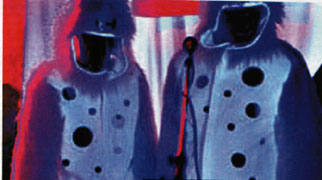
For over 15 years John Balance and Peter "Sleazy" Christopherson of Coil, accompanied by numerous and varied collaborators, have used sound to explore the fringes of what is known. Through their music, they ride the visionary mystical current previously channelled by the likes of John Dee, William Blake, Aleister Crowley and Austin Osman Spare, ballasted with healthy doses of humour, psychedelia and cosmic wonder.
Coil's music is in a state of constant flux, ranging from the subtly inductive to the abrasive and confrontational, through some catchy pop and dance tracks. Their first record, 1984's How to Destroy Angels, was a 20 minute ritual workout for gongs and bullroarers, aimed at the "accumulation of male sexual energy". The next 15 years saw the release of only three albums and a handful of compilations, all full to breaking point with dense and involving music, across a wide range of genres, some of which still don't exist today. Recently Coil have tapped a rich new vein of inspired productivity, and have performed live for the first time since the early 1980s. Their most recent releases - the deeply affecting, hypnotic tonal shifts of Time Machines, Astral Disaster's cosmic waves, gently lapping at the shorelines of infinity, and the crackling, aetheric, melodic electronics on Musick to Play in the Dark, Vols 1& 2 - can all be recommended unreservedly to those with more precarious musical tastes.
Surrounded by original Austin Spare and Aleister Crowley paintings, MARK PILKINGTON spoke with John Balance over a glass of Coil's favourite tipple, affectionately known as "The King's Piss", at their home in the farther reaches of the West Country.
Live images: Ruth Bayer, JB pics: Mark Pilkington.
FT: The album Worship the Glitch, is jointly credited to Coil and ELpH. Who or what was ElpH?
JB: Coil work under a number of pseudonyms, Eskaton, Black Light District etc, but when we entered into the ELpH project we felt compelled to do it, it was strange. Normally we have a musical reference, we say "let's do an album in the style of Cluster" (German '70s electronic drone group MP), then we'll approximate it and go off at a tangent, but with ELpH the three of us, myself Peter, and Drew McDowell really felt that we receiving extraterrestrial messages transmissions and we just went with it. The sound was designed by whoever, or whatever, was coming through us. Throughout, the William Burroughs phrase, "Stars splash the silver, answer back" was behind the recording session. We did it in a week, and for that week it was as if the transmission was in full flow, and at the end of the week it stopped And we haven't got it back since, which is why we haven't done another ELpH album. We keep hoping that they - whatever it was - will contact us again, because we really want to do one. Maybe it was a one off.
FT: Did you ever try to contact it through channelling or anything like that?
JB: I'm very wary of channelling, although having studied magic I do know how to banish and protect. I think channelling can be very dangerous. Several acquaintances have had negative experiences with it...Having said that I might consider it in the right circumstances.
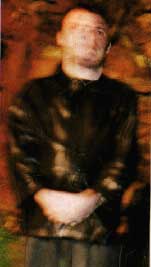
FT: Perhaps your equipment was somehow picking this up?
JB: I don't know, it didn't feel like an electrical transmission at all, it felt very fluid. It could have been something earthbound, rather than extraterrestrial. An earth spirit or something like that.
FT: Whereabouts were you recording?
JB: In Chiswick, London! The notorious Chiswick goblins at work!
FT: Have you ever experimented with Electronic Voice Phenomena?
JB: No. What we do is buy old tape recorders and use the messages we find on those. But that's a different thing, found sounds as opposed to found objects. I'm interested in that though, Burroughs was also very interested in it. It's a bit like people who pick radio waves up through fillings in their teeth, and they can.
FT: How has magic(k) seeped into your music(k)?
JB: Well it has, totally. I've always been into magic, with Crowley's 'k', and studied it - I tried to buy stuff by Crowley when I was young, but my parents absolutely refused to have anything to do with it and actively discouraged me. I wrote to Alex Sanders (King of the Witches), when I was 14, and he wrote back to me saying thanks for writing, I'm very pleased that you want to do this, but can you write back when you're 18. He wouldn't accept anyone so young into his coven. I used to worship the moon too, I'd encourage other boys at school to do it to. I just instinctively did things like that. It once got me into trouble. I was at school with the son of David Tomlinson, who was in Bedknobs and Broomsticks (a Disney comedy about witches). The two of us were taught astral projection by a teacher and there was a scandal because they thought there was some homosexual relationship going on with the three of us, but there wasn't. I went to school one day and there was David Tomlinson's limousine outside - he grabbed me as I was coming off the school bus and asked whether his son and I had a sexual relationship with this teacher. From then on, all the teachers were watching me!

FT:So there was no specific point when you started practicing magick?
JB: No, even as a kid I used to do it. I was an only child, always talking to animals, fantasy creatures and spirits. I would make little plasticine gods and make offerings to them. I was just born with a pagan sensibility. I'm an animal, I've never been a human - there's no difference between animals and humans to me. I think that's one of the signs of a true pagan.
Some life experiences can just jolt you into it. I had German measles really badly, twice I think, and wasn't allowed contact with the light in case I went blind. Shut in this dark room, that was like my initiation, I imagine.
FT: Was Alex Sanders your first contact with structured magical techniques?
JB: Well, I'd say Max Ernst was, very obliquely. I realised he was certainly a shamanic type. That's when I realised there were a few magical people around. Up until that point the only time I'd encounter witchcraft was when Anglia Television would report horror stories about covens linked to peoples' disappearances. That's when I realised how biased the media was towards magic, and it all served to push me further in that direction. Every time I came across some obstacle, I became more determined in my belief that this was the correct way to proceed with my life, and my work.
I then went to university, but left after a term and joined Psychic Television (early '80s experimental band formed out of Throbbing Gristle by Genesis P Orridge and Peter Christopherson). Through TG I was introduced to William Burroughs, and the general concept of magic as a practicality in everyday life. Then in PTV we all began to actively explore it as a group, and play with it - provocatively, and perhaps dangerously. Genesis is magical, and has his own path to follow - he tends towards organisational stuff and likes to lead, but it's not our path. When that soured, and divided and became too complicated, I decided to do my own group, Coil. As soon as I discovered Austin Spare I realised that we were loners, we practiced magick on our. That's my style of magic, the shamanic way - and Spare was definitely a shaman.
FT: Do you think there's a distinction to be made between the more ritualised path of Psychic TV - perhaps more akin to the Western tradition of ritual magic - than your own, more intuitive approach?
JB: Well, the core of people in PTV were all shamanic, Genesis is definitely, concretising ideas from various traditions, but we assumed the mantle of organised religion, copying aspects of The Process Church (see article), Jim Jones and actual clerical stuff, and we came across as a cult, but we were in fact individually practicing sexual magic. So that was a camouflage, which eventually became a trap that we had to break away from. I felt very strongly that we had to get away from that.
FT: There was a lot of negative attention to the cult-like aspects of that scene. Was that something that you tried to evade, or did you play on it?
JB: We originally played on it, to be honest. And at that time you could play with that sort of thing. It was only later on, when Thatcher came to power and the government started introducing repressive law reforms, the Video Nasty panic began - everything we were playing with far more dangerous and far more serious to be associated with. For our own good, then, Coil had to disassociate ourselves.
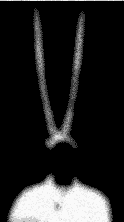
When Gen got raided by the police in 1992 (as a result of false allegations made in a Channel 4 documentary about Satanic Ritual Abuse. A Psychic TV music video was shown as 'proof of a such abuse', see FT:64:50), in which they took years worth of rare archived material, his response was to go to America. We weren't raided, but we lived in fear, as we had equal reason to be targeted at the time, and we had to clear our house out of anything that could ever be found in any way provocative. It was horrible, absolutely awful. I felt terrible for him, but Gen had a break and was allowed to move on, whereas we lived in fear for five years, never knowing whether the consequence of things that we did quite innocently and legally back then might rebound on us.
FT: It seems that there are regular resurgences of claims of Satanic Ritual Abuse, but do you think that those dark days have passed now?
JB: Well the focus has now changed to paedophilia, hasn't it. The pendulum has swung round to another target group. Satanists are safe for a while!
FT: You're accused of using satanic imagery...
JB: That's Pan, there's a huge distinction. I'm not a Christian, Satan does not exist in my cosmology. Not even on a rock 'n' roll Marilyn Manson level, or an Anton LeVay level. That's showbiz Satanism, I don't buy into any of that at all. Pan is certainly one of my deities, one that I find solace and power in. Pan represents zero, the void, and nature, both aspects. The wild side. It's hedgerows. My core belief is that instead of the Millennium Dome they should have planted forests, all the hedgerows should be restored. That's my magical feeling at the moment, rather than anything ritualistic or Crowleyan - to restore the countryside is imperative. Someone accused us after our first concert (at the Royal Festival Hall, London 1999) of being tree huggers, and I thought, what the hell is wrong with that. "We will fight them in the beeches", as they say! I've heard now that if you're a member of Earth First, you are labelled a terrorist, it's what MI5 are now spending their time looking into. It's insane.
FT: Can you tell us a little about your relationship with Austin Spare.
JB: Well, I have a very intimate relationship with Spare. He's my mentor. I communicate with him through his pictures and often ask his advice, as an ancestor. A lot of his beliefs were shamanic and to do with ancestor worship. I don't have a very close connection with my ancestors, my real family, other than my mother's parents, so I talk to Spare for advice. I think he still exists, in his art and in the aether. He's around as a helper. Sounds a bit flaky doesn't it, maybe I should couch it in cyber terms!
FT: I suppose the best art - painting, writing, photography, music, film whatever- acts like a time machine, transporting you to another mind, time or space.
JB: I'd view it as a magical current. Austin Spare had people who came through for him, spirit guides, and there are magical currents. He may have opened up a gateway or whatever, but now it's flowing in trickles, rivulets, even streams. That's why it's very important that we flash Zos Kia Cultus - Spare's magical philosophy or code - and his images onto the screen at our performances, to energise Spare's current and put our own energies into it. To make it a living, breathing, energising, wonderful thing. By Cultus I don't mean a cult, but a way of life, a philosophy, a code, which puts me in touch with what I really, truly should be doing on this planet.
Like Burroughs, or Spare, there's no difference between our philosophy, our lifestyle and our art. This is what we do. We are what we do. What Spare did in art, we try to do through music. This is why we do sidereal sound. The way he twisted his pictures, so that the geometry appears warped, we try to do that, to produce strange geometries through sound, so that it comes out sideways. We do it with technology, with 3D devices, phasers, out-of-phasers, all sorts of gizmos. There's no one particular box that does it, we all do it any possible way that we can. When we play our next gig, in France (at the Montreau Jazz Festival!), we'll hopefully be using quadraphonic sound. Spare used to do speaker battles, where he would project sound into the aether - which I think is a real physical thing, some kind of cosmic glue - a genuine substance, or non-substance - that connects everything and allows unexplained things and ideas to be transmitted.
FT: Is there a particular type of person who you find collects Spare's art?
JB: People with integrity. He really sorts the bullshitters out. You either get Spare or you don't. Although they're often decorative, the intention behind the decoration often hits you first. Most people who come into contact with Spare's work come away from it with something positive. There's a massive power there, he imprinted each picture with a power, purposefully. They resonate on a psychic level, some more than others, but they all have a power that transmits to you. You can commune with them and they change. Some of the chaotic ones, you look at them with one person and see certain things, and you look at them with another person and you see a completely different set of things. Every piece he did was magical. There were some that were done for other people specifically as magical spells, such as the stele or the magical alphabet. But he lived his life as a magician and a stoic. He could survive for a week on a kipper.
FT: Psychedelics have become a more apparent theme in the more recent Coil material...
JB: And paradoxically we don't do them any more! We were so busy doing them before that we didn't get any records out! After Horse Rotorvator (1987) we were completely psychedelicised for about five years, and hooked up with Terrence McKenna - "Coil rule!" he said in an email. It's a great shame about his death, though I'm sure he wouldn't see it in those terms, but as a transformation.
FT: He's with the Machine Elves now.
JB: The self-transforming Machine Elves.
FT: Psychedelics must have transformed the way you approached sound. How do they relate to the Time Machines project?
JB: They did more than that. I was taking magic mushrooms from the age of 11 - a lot, until I was about 18, just at school. And they never did a bad thing, always taught me wonderful things. They taught me how to appreciate music and eventually told me to make music. As I've said before, I feel that I was brought up by mushrooms. They are teachers. Time Machines is explicitly to do with combining sounds with psychedelic tones. The Harmaline B molecule, like any other complex alkaloid, is represented as a ring, but when you take DMT, or Yage or Ayahuasca, there's also a ringing tone, a psychic tone. And with DMT there's a kind of crumpling sound. So Time Machines was inspired by Terrence McKenna's idea that Time Machines will only ever appear here once they have been made, and will come back to us.
FT: Dennis McKenna, Terrence's brother, he described hearing the sound of his DNA singing while using Ayahuasca.
JB: yes, he's the one who went furthest out of that lot.
FT: So the intention was to create a musical time machine?
JB: Yeah, but you don't have to be on the drugs mentioned on Time Machines at all. It's an attempt to recreate some of these psychedelic states using sound. And we did extensive research, testing whether these tones would actually transport you. The ones that did we titled and put on the record.
FT:There were some I'd not come across before, like Hecate. Was this an Alexander Shulgin creation?
JB: Probably, we got it off Spiral Tribe (an early '90s travelling 'rave' community), who called it DOET. It's a very strange compound, we took it several times in Thailand. Once we were in Shang Mai, a town in North Thailand, originally a walled city with a moat around it, though it's spread further out now, we were standing by the moat, alongside these old ramparts, probably 14th century. At first we got the usual euphoria and heightened sense of awareness, of the luminous majesty of everything, then, as we took more, it all crumbled as the layers of time stripped away and the ground became bare fields again. So that's where the whole Time travel thing came from.
But if you went further on DOET you found nothingness, all your sensory input would meet this absolute nothing. Not even a void, as that gives it a name, it was just a greyness. Then you'd come back and it was an hour later. Very strange.
FT: Sort of a sensory overload, like white noise?
JB: Yeah, it was like that. We're tempted to do a five CD Time Machines box set, with a whole CD dedicated to each tone. The whole thing would be dedicated to psilocybin. That's a very benign substance. I'm an admirer of mushrooms.
FT: A mycophile?
JB: A mycophiliac? But I haven't taken any of these things for ages.
FT: Do you miss them?
JB: Do they miss me? I don't know. It's like Terrence McKenna said, once you've been there, why go again? I'm more tempted to go to Mexico and do Peyote with the Huichol Indians. I need to move my area of psychedelic learning to another place. If I went to Yucatan or Palenque, and took mushrooms there with shamans, that would be more appropriate. I don't really appreciate England at the moment, and I don't want to learn anything psychedelically in this country...
Did you see that programme on lemurs recently? One of them had a big poisonous centipede and it kept putting it into its mouth and chewing it, and this lemur was clearly tripping out! Its eyes were rolling back, and it almost fell out of the tree and kept doing it over and over again. I wish William Burroughs had seen that, I'll have to tell him in a dream.
FT: On the subject of dreams, by monitoring their brain waves, scientists have found that birds practice their songs while they sleep. How important are dreams to you and your music?
JB: I lucid dream all the time. Through astral projection I learnt to do it at will. And now I don't astrally project anymore, but I reckon one out of three dreams I have is a lucid one. It's quite exhausting. I'll set myself tasks, like banishing dark areas, or just go around knowing it's a dream, but it's not like sleeping, you've just been round talking to all these people all night.
FT: I suppose in many ways you're not actually sleeping, because your brain is still acting as if you were awake.
JB: I'm not sure what the brain actually does. But I feel incredibly privileged. Then you also fly. I've had situations where I've been dreaming in my house and the layout is exactly the same, not distorted like in a dream. And I've asked myself, "Is this a dream?", at which point I've leapt up into the air and taken off. There's a huge sense of euphoria when you start floating around. I like to show off in my dreams!
FT: Have you ever experienced precognitive dreams?
JB: No, but - and this is absolutely true - our first ever album, back in 1985, was going to be called "Funeral Music for Princess Diana". That was based on a dream I had. I was sure she was going to die prematurely. I can't remember how she died in the dream, though I don't think it was a car crash.
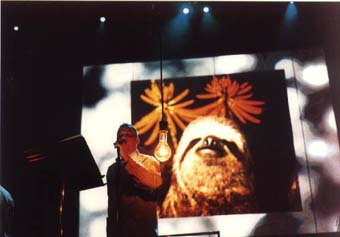
FT: Your recent live performances at the Royal Festival Hall were powerful, both physically and psychically, how do you go about creating something like that?
JB: We try to put magick in the music, and we do a lot of preparation for that, from finding the right frequencies on the modular synthesizers to using the right incense, or the right colours on the screen. We usually take stuff from Crowley's book of magical correspondences 777, and mix it with intuition and research.
It's certainly powerful, but we definitely don't aim to injure! In Thailand we came across this drug rehabilitation unit that was also for psychiatric patients. They would use loud noises to exorcise the spirits, and basically they'd be amplifying buzz saw on either side of your head with big speakers and banging gongs and completely freaking people out, but they were doing it to banish spirits. So the last gig, Constant Shallowness Leads to Evil we were attempting to do something like that. We're building it up and want to do bigger versions of it, to shake the bad stuff out. Look at what's happening now with everybody's mobile phones - peoples' brains must be completely scrambled. This is what we're trying to do in concert, to blank this out, through the use of white light, white noise and video projections. Hopefully we can provide some sort of safe area where all that is not going on, to allow people to be themselves in that particular time / space. Outside you just can't avoid it anymore, what with visual pollution from advertising, noise pollution, both audible and inaudible, microwaves. That's one of the things we're trying to negate.
FT: How does it feel now, having not played live for almost 15 years?
JB: Strange. I reached a point in my life where I've learnt a bit, I've absorbed a lot and I've got a lot of things, and now I want to put it back, put myself at the service of the current that we're living. If I'd approached it at an egotistical level I would never have got on stage. I'm really nervous and shy. I can hardly speak to people in shops, let alone on stage at the Royal Festival Hall. I just feel that I'm doing this as a duty.
FT: A lot of people would describe your music as dark, though it's less so now, you're letting the light in. Is that a conscious decision?
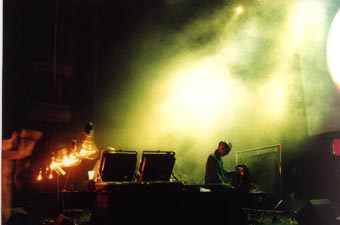
JB: Well it's partly age, though I'm not mellowing, I'm getting angrier if anything. It was "a complete derangement of the senses" as Rimbaud said, that was always what I was aiming for earlier on. I was much more into chaos, and punishment almost. If I stayed up I'd stay up for five days, if I did live performance it would involve blood enemas and cutting myself up. And then I realised that it's OK to do that, but we wanted to make music that would take people places, be more constructive if you like, both for myself and others. I was literally destroying myself in creating these things, certainly Love's Secret Domain (1990) - it was very, very heavy making that album, drug wise and in all sorts of ways. So we thought, let's try to do music that's more healing or holistic, but not in a New Age way as it can still involve noise and abrasion, but the intention behind it is healing. It's just a different approach really, I'd never say we'd mellowed.
We like to think of what we're doing now as Moon Musick. When we lived in Chiswick, by the Thames, we became very aware of the tidality of the river, we'd go down there every evening. So we decided to move to the sea. We'd become lunar, switched into this lunar phase. The first thing we did, How to Destroy Angels, which was a conjuration of Martian energy, male, homosexual energy. In fact people claimed that it was misogynist, and Rough Trade almost wouldn't stock it - a controversy in a tea cup. But now we're in a lunar phase, very moon orientated. Arabic culture uses a lunar calendar, they have moon letters and sun letters, and the pre-Christian celts also used a lunar calendar. It's so much more natural. I'm on a mission to put the moon back into perspective. So like Sun Ra came from Saturn, we, at the moment are at the moon. Maybe we'll reach Saturn one day.